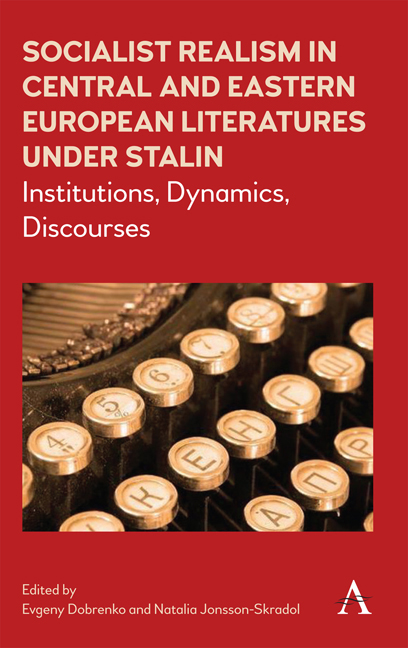 Socialist Realism in Central and Eastern European Literatures under Stalin
Socialist Realism in Central and Eastern European Literatures under Stalin Book contents
- Frontmatter
- Contents
- Acknowledgements
- Introduction
- Part 1 Institutions
- Part 2 Dynamics
- Part 3 Discourses
- 15 Introducing Socialist Realism in Hungary, 1945– 51: How Politics Made Aesthetics
- 16 When Writers Turn against Themselves: The Soviet Model and the Bulgarian Experience, 1946–56
- 17 Big Brother's Gravity: East European Literature in the Mirror of Soviet ‘Thick Journals’ in the Late 1940s
- 18 The Coming One: Prolegomena to the Positive Hero of Czech Socialist Realism as a Transforming and Transformed Subject
- 19 Will Freedom Sing as Beautifully as Captives Sang about It? Reshaping the Croatian Canon, 1945–55
- 20 The Salon in the Camp: Friendship Societies and the Literary Public Sphere in the SBZ and Early GDR
- Conclusion
- List of Contributors
- Index
19 - Will Freedom Sing as Beautifully as Captives Sang about It? Reshaping the Croatian Canon, 1945–55
from Part 3 - Discourses
Published online by Cambridge University Press: 10 May 2018
- Frontmatter
- Contents
- Acknowledgements
- Introduction
- Part 1 Institutions
- Part 2 Dynamics
- Part 3 Discourses
- 15 Introducing Socialist Realism in Hungary, 1945– 51: How Politics Made Aesthetics
- 16 When Writers Turn against Themselves: The Soviet Model and the Bulgarian Experience, 1946–56
- 17 Big Brother's Gravity: East European Literature in the Mirror of Soviet ‘Thick Journals’ in the Late 1940s
- 18 The Coming One: Prolegomena to the Positive Hero of Czech Socialist Realism as a Transforming and Transformed Subject
- 19 Will Freedom Sing as Beautifully as Captives Sang about It? Reshaping the Croatian Canon, 1945–55
- 20 The Salon in the Camp: Friendship Societies and the Literary Public Sphere in the SBZ and Early GDR
- Conclusion
- List of Contributors
- Index
Summary
Ljudevit Galic was an actor, with no formal education. Mobilized in 1941, he struggled
through the war acting in provincial theatres. He joined the partisans in Bosnia. When the war was almost over, in 1945, he was 26. Freedom was near, and he was anxious: ‘My worries […] were great. What will become of us when this disaster is over? Everything is a menace and mostly the thought that “time will overtake us” unless we educate ourselves. Endless discussions in last few months discovered many gaps in our general and professional education. We have sunk very low,’ he wrote in his wartime memoirs. For Galic, as for many of his contemporaries, the coming freedom was a source of anguish. If he was to enjoy it fully, he had to educate himself, go to school. What should he read?
As a man of culture in need of a general education, Galic was presumably going to read literature, for as Roland Barthes remarked in Refléxions sur un manuel (Reflections on a Manual), ‘literature is what is taught in school’. What was this new literature going to be? How was it going to be thought? There is not a shred of irony in Galic's words. Desperate to read the right kind of books, Galic (or the way he remembered himself years later) was already a stock type of a certain kind. Gorky would have loved him.
In its elegant simplicity and tricky banality, Galic's text triangulates the complex relation between the experience of trauma, the fear of change and the possibility of survival, as seen from the point of view of a victim or object of change. In the war, Galic was a victim. For a victim, to survive is to transform oneself into a subject. But becoming a subject is never a simple affair. This accomplishment was beyond his means. Like writers of realist literature in the pre- war period, Galic saw himself in need of a ‘perspective’, presumably in order to ‘fight for socialism and its realization’. And ‘perspective’, for him, equalled education.
It is important to see that the new ‘perspective’ was not, or not entirely, imposed from above. Realism with a ‘social perspective’ existed before the war.
- Type
- Chapter
- Information
- Socialist Realism in Central and Eastern European Literatures under StalinInstitutions, Dynamics, Discourses, pp. 319 - 326Publisher: Anthem PressPrint publication year: 2018


